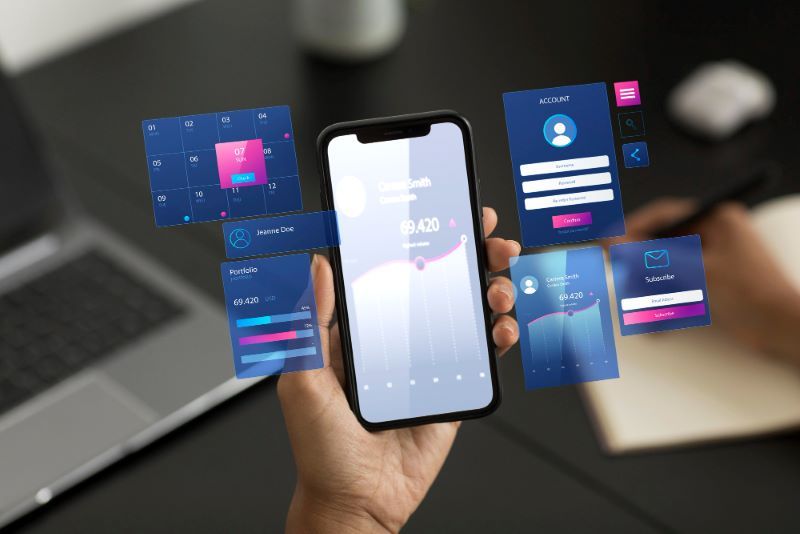In today’s fast-paced digital era, businesses need to stay ahead of the curve to remain competitive. One key strategy is leveraging mobile app development solutions. With more consumers relying on smartphones for their everyday needs, the demand for customized and high-performance mobile applications is skyrocketing. Whether you’re a startup looking to launch a new service or an established brand aiming to enhance customer engagement, the right mobile app development solution can transform your business.
Mobile apps are no longer just an add-on; they are essential tools for scaling operations, reaching wider audiences, and improving overall efficiency. But how do you choose the right solution? In this blog, we’ll explore the various aspects of mobile app development, the benefits it offers businesses, and why investing in a high-quality solution is crucial for your growth.
Why Mobile App Development Solutions are Crucial for Business Growth
Mobile apps serve as a direct communication channel between businesses and their customers. They provide a seamless user experience that can significantly boost customer satisfaction and retention. Here’s why investing in mobile app development solutions is essential for modern businesses:
1. Enhanced Customer Engagement
A mobile app provides a more personalized and convenient way for customers to interact with your brand. Whether it’s through push notifications, user-specific content, or in-app messaging, businesses can engage users in real-time. This direct access is invaluable, particularly when compared to other channels like social media or email, where engagement rates can be lower and less personalized.
2. Increased Accessibility
A well-designed mobile app makes your services or products more accessible. Users are more likely to interact with an app they can access in a few taps, compared to a website that requires opening a browser and navigating multiple pages. Mobile apps simplify the customer journey, providing quick solutions that align with their on-the-go lifestyle.
3. Brand Visibility and Recognition
Mobile apps act as a constant reminder of your brand as they live on your customer’s mobile screen. Every time a user unlocks their phone, they see your app icon, which reinforces brand recognition. This increased visibility can result in stronger customer loyalty and higher conversion rates.
4. Higher ROI Through Direct Sales Channels
Unlike traditional websites or physical stores, mobile apps offer a more direct channel for making sales. Features like in-app purchases, push notifications for deals, and personalized recommendations streamline the sales process, leading to a higher return on investment (ROI).
5. Data Collection for Business Insights
Mobile apps allow businesses to gather user data, such as browsing habits, user preferences, and purchasing behaviors. These insights can be used to make informed decisions regarding product development, marketing strategies, and overall business direction.
Key Considerations When Choosing Mobile App Development Solutions
To unlock the full potential of mobile technology, selecting the right mobile app development solutions is critical. The best approach depends on several factors, such as your business goals, target audience, and the type of experience you want to deliver.
1. Native vs. Cross-Platform Development
One of the first decisions you’ll need to make is whether to opt for native or cross-platform development. Native apps are built specifically for a single platform (iOS or Android), providing a seamless user experience with better performance. On the other hand, cross-platform apps are designed to work on multiple platforms with a single codebase, saving development time and cost. Depending on your target audience, you may want to choose one over the other.
2. User Experience (UX) and User Interface (UI) Design
A successful mobile app isn’t just about functionality; it also needs to provide a great user experience. The UX/UI design should be intuitive, aesthetically pleasing, and responsive. Apps that are difficult to navigate or slow to load will likely result in user frustration, leading to poor retention rates.
3. Security Features
With the rise of mobile app usage comes the growing concern for security. Mobile apps that handle sensitive information, such as personal data or payment details, must prioritize security. Ensure that the mobile app development solutions you choose offer strong encryption, two-factor authentication, and secure data storage options.
4. Scalability and Future-Proofing
Your app needs to grow with your business. The mobile app development solution you choose should be scalable, allowing for updates and the addition of new features as your customer base expands. Building a future-proof app will save you from having to rebuild the app or switch development teams down the line.
5. Cost and Time Efficiency
Finally, businesses need to balance the cost of development with the potential benefits. While opting for a cheaper solution might seem attractive in the short term, it may not deliver the long-term performance and scalability that a high-quality mobile app requires. It’s important to evaluate your budget alongside your goals to find the best solution.
Mobile App Development Solutions: Types and Technologies
To dive deeper into what mobile app development solutions entail, let’s explore some common types and technologies used in modern app development.
1. Native Mobile App Development
Native apps are developed using specific programming languages like Swift for iOS and Kotlin for Android. They provide superior performance, faster execution, and a more integrated experience on the respective platform. Native app development is ideal for companies that want to deliver the best user experience on a single platform.
2. Cross-Platform Development
As mentioned earlier, cross-platform development enables businesses to build apps that work on both iOS and Android with one codebase, often using frameworks like React Native or Flutter. This method saves time and development costs but may result in slightly lower performance compared to native apps.
3. Progressive Web Apps (PWAs)
Progressive web apps blur the lines between mobile apps and websites. PWAs are essentially web applications that function like native apps, offering features such as offline access, push notifications, and quick load times. They don’t require installation, making them a cost-effective solution for businesses that don’t need a full-fledged app.
4. Augmented Reality (AR) and Virtual Reality (VR) Apps
AR and VR are rapidly gaining traction in sectors like retail, real estate, and entertainment. These apps offer immersive experiences that engage users in unique ways, such as virtually trying on clothes or viewing properties. If your business involves high interaction and visualization, AR/VR app development might be the way forward.
5. IoT-Enabled Apps
As the Internet of Things (IoT) continues to grow, so does the demand for IoT-enabled apps. These apps connect with smart devices, allowing users to control various elements of their environment, from lighting and thermostats to home security systems. IoT apps provide businesses with an opportunity to offer innovative solutions that integrate seamlessly into everyday life.
How Mobile App Development Solutions Drive Innovation
Mobile app development is not just about creating functional software; it’s about driving innovation. By offering innovative features and utilizing cutting-edge technologies, businesses can redefine how they interact with their audience and differentiate themselves from competitors.
- Personalization: AI-driven algorithms can analyze user behavior to deliver personalized content and recommendations, enhancing user satisfaction and engagement.
- Automation: Businesses can use mobile apps to automate processes, from order tracking to customer service, allowing for increased efficiency and reduced human error.
- Blockchain: Blockchain technology can enhance the security of mobile apps by decentralizing data and offering transparent, tamper-proof transactions, particularly in finance or healthcare.
These innovations are transforming industries and changing the way businesses operate, making mobile app development solutions a crucial investment.
Conclusion
In a world where mobile devices dominate, businesses must adapt to the changing landscape to survive and thrive. By leveraging the right mobile app development solutions, companies can enhance customer engagement, streamline operations, and ultimately, boost their bottom line. From improving accessibility to driving innovation, a well-developed mobile app is a powerful tool for growth.
Choosing the right development solution is not just a matter of convenience but a strategic decision that can shape the future of your business. Whether it’s through native development, cross-platform options, or the integration of AR/VR technologies, the possibilities are endless.



